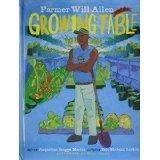Last updated on 2025/05/01
Farmer Will Allen And The Growing Table Summary
Jacqueline Briggs-Martin
Cultivating passion for sustainable farming and community.
Last updated on 2025/05/01
Farmer Will Allen And The Growing Table Summary
Jacqueline Briggs-Martin
Cultivating passion for sustainable farming and community.
Description

How many pages in Farmer Will Allen And The Growing Table?
32 pages
What is the release date for Farmer Will Allen And The Growing Table?
In "Farmer Will Allen And The Growing Table," Jacqueline Briggs-Martin weaves a compelling tale of resilience, innovation, and the transformative power of urban agriculture through the life of Will Allen, a former pro basketball player turned visionary farmer. Set against the backdrop of Milwaukee, this inspiring story invites readers into Allen's world, where he cultivates not only fresh vegetables but also hope and community by empowering those in need to grow their own food. As children and adults alike discover the joys of hands-on gardening and the significance of nurturing the land, they embark on a journey that revitalizes their health, their neighborhoods, and their futures. Join Will Allen on this remarkable adventure that celebrates the essence of food, growth, and the boundless possibilities that spring from the ground.
Author Jacqueline Briggs-Martin
Jacqueline Briggs-Martin is a celebrated author of children's literature, renowned for her engaging storytelling that blends real-life experiences with educational themes, particularly in the realms of nature, agriculture, and sustainability. With a passion for promoting awareness about environmental issues and the importance of healthy eating, Martin has penned numerous books that inspire young readers to appreciate the world around them. Her work is characterized by meticulous research and a compelling narrative style, enabling her to highlight the stories of influential figures, like farmer Will Allen, whose contributions to urban farming have reshaped communities. Through her writing, Briggs-Martin not only entertains but also empowers children to think critically about their food sources and the environment.
Farmer Will Allen And The Growing Table Summary |Free PDF Download
Farmer Will Allen And The Growing Table
chapter 1 |
In the first chapter of "Farmer Will Allen and the Growing Table" by Jacqueline Briggs-Martin, we are introduced to the remarkable figure of Will Allen. Tall and robust, akin to the agricultural tools he wields, Will is depicted as a lively and engaging person who commands the attention of those around him with his warmth and charisma. The narrative reflects on his belief that everyone deserves access to nutritious food, a conviction that continues to guide his endeavors. The chapter takes us back to Will’s childhood, highlighting the central role food played in his family life. Meal times were significant occasions, with his mother preparing bountiful feasts, serving dishes such as peas, greens, and his favorite, lima beans with ham. These meals not only filled their bellies but also brought a sense of community, often welcoming visitors who would leave the table rejuvenated. Despite the absence of luxuries like a car or a television, the Allen family thrived on the wholesome food they grew themselves. As a child, however, Will was ambivalent about the labor involved in farming. He envisioned a future away from the Maryland fields, dreaming instead of a life dedicated to basketball or a more conventional office job. Following his graduation, he pursued this dream by moving to Belgium to play professionally. It was there, while helping a friend with potato digging, that Will felt a profound connection to the soil—a realization that reignited his passion for farming. After concluding his basketball career, Will transitioned to a white-collar job in Wisconsin but continued to cultivate vegetables on his in-laws’ land. His experiences in Belgium and the realization of the scarcity of fresh produce in urban areas fueled his desire to create a new kind of farm. Will was committed to the idea that everyone, no matter where they lived, should have access to healthy food. This vision laid the groundwork for what would become his life's work, inspiring him to turn abandoned urban spaces into thriving gardens, thus bringing nourishment and community back to the city. Through the vivid portrayal of Will Allen's life, the chapter encapsulates his journey from a reluctant farmer to a passionate advocate for food accessibility, using his personal experiences as a catalyst for change in the urban food landscape.
Key Point: Access to nutritious food is a fundamental right.
Critical Interpretation: Imagine being part of a movement where you play a role in ensuring that everyone around you, regardless of their background or where they live, can enjoy healthy and nutritious meals. Will Allen's journey inspires you to see your power in addressing food inequality in your community. It encourages you to reflect on your own connection to food and the impacts of where it comes from. You might find yourself searching for ways to cultivate a garden, support local farms, or advocate for policies that champion food justice. The warmth and sense of community that Will fostered at his family table can be a model for you, reminding you that food is not just sustenance but a way to connect with others, share resources, and create a healthier, more equitable world.
chapter 2 |
In the heart of Milwaukee, Will Allen, a determined farmer, seized an opportunity when he discovered a plot of land, the size of a supermarket, littered with abandoned greenhouses. Envisioning a vibrant community space where city kids could savor freshly harvested vegetables, Will purchased the neglected site. However, his excitement was quickly tempered by the realization that the soil was tainted with chemicals and pollution. Lacking the funds to replace the soil, he drew on his experiences from Belgium, where he learned the art of composting using food waste. Determined to transform the "dirty" soil into a fertile foundation, Will enlisted the help of his friends to collect food scraps, ranging from apple peels to old zucchinis. He meticulously organized the scraps in large buckets, creating compost piles enriched with hay, leaves, newspapers, and the all-important red wiggler worms. These worms became integral to his composting process, efficiently breaking down the organic matter and transforming it into nutrient-rich soil. Throughout this journey, neighborhood children became curious about his efforts and eagerly joined him, learning about composting and the fascinating world of worms. As time passed, Will and the kids diligently studied the dietary needs of the red wigglers, refining their composting strategy. They learned to avoid harmful substances while providing the worms with a diet that included watermelon rinds and sweet potato scraps, ultimately realizing the value of worm "magic" in enhancing soil quality for crop growth. With improved soil ready for planting, Will faced another hurdle: limited space on his urban lot. Refusing to be discouraged, he creatively utilized every available inch, utilizing vertical spaces by hanging plant baskets and growing vegetables in containers and stacked shelves. He introduced hoophouses to maximize planting capacity, extending the growing season and enabling him to cultivate a diverse array of vegetables. Additionally, Will integrated aquaponics into his urban oasis, incorporating fish that provided nutrient-rich wastewater, which nourished his sprouts, while the plants, in turn, filtered the water for the fish. This innovative three-part ecosystem not only fostered a sustainable environment but also enriched the biodiversity of his project. To further diversify his urban farm, Will added goats, chickens, turkeys, and bees, creating a vibrant micro-farm he proudly named "Growing Power." Through his relentless innovation and community involvement, Will transformed a neglected plot of land into a flourishing farm, all while inspiring a new generation of gardeners and healthy eaters.
Key Point: The power of resilience and community involvement in overcoming challenges.
Critical Interpretation: As you immerse yourself in Will Allen's journey, you realize that life's obstacles often feel daunting, much like the polluted soil he inherited. However, just like Will, you possess the ability to envision a brighter future even in dire circumstances. By gathering your resources and surrounding yourself with a supportive community, you can transform your challenges into opportunities for growth and innovation. His story illustrates that, with grit and collaboration, you can turn the 'dirty' aspects of your life into fertile soil for success and creativity, ultimately inspiring others as you cultivate a thriving environment around you.
chapter 3 |
In chapter 3 of "Farmer Will Allen And The Growing Table," Will Allen, the protagonist, embodies the spirit of urban agriculture as he seeks to expand the reach of fresh food within city landscapes. He wears simple work clothes, but his ambitions are grand, aimed at creating a large-scale food source that benefits communities both locally and globally. 1. Will recognizes the limitations of individual farming and contemplates how to gather additional support to achieve his vision. Observing the diverse people around him—teenagers, families, and elders—he realizes that the potential for farming exists in the very heart of the city. His farm, affectionately referred to as his “table,” already yields thousands of pounds of produce, serving an array of customers from local residents to upscale restaurants. However, he aims for a more expansive vision: a table that spans continents, ensuring that healthy food is accessible to all. 2. To address the challenge of cultivating this world-sized table, Will shifts his strategy from being a singular farmer to one who empowers others. He travels extensively across the United States and internationally, sharing his knowledge on urban farming and inspiring individuals to cultivate their own food. His impactful workshops have even reached places like Kenya and London, where he introduces innovative farming techniques. His Milwaukee farm attracts around twenty thousand visitors each year, eager to learn about sustainable practices, witness livestock care, and enjoy fresh greens. 3. Will's aspirations remain boundless. He expresses a need for fifty million more urban farmers, advocating for the creation of gardens in unconventional spaces—such as rooftops, side yards, and abandoned lots. He envisions a future where urban farms are as ubiquitous as streetlights, reinforcing the idea that anyone can be a farmer, regardless of their location. 4. Will challenges the reader to see the potential within themselves, particularly in young people. He asks if they will join him in cultivating food for their families and neighbors, proposing that they take action by planting gardens in any available space—be it porches, roofs, or even bedrooms. He encourages the creation of compost bins to nurture healthy soil, emphasizing the importance of taking charge of one's food source. 5. In his afterword, Will reflects on his own journey from someone who initially resisted farming to becoming a passionate advocate for sustainable agriculture. He believes that everyone has the power to contribute to a healthier food system by growing vegetables and fruits. He invites readers to visit his Growing Power farm in Milwaukee, fostering a sense of community around food education and sustainability. Through this engagement, he expresses his excitement for the future and the collective potential for fostering epicurean growth. Through his narrative, Will Allen inspires readers to embrace the art of farming, emphasizing that even small actions can lead to significant changes in their lives, communities, and the wider world. By cultivating a fresh food ethos, everyone can play a role in nourishing bodies and fostering connections in their neighborhoods and beyond.
Key Point: Empowerment Through Urban Farming
Critical Interpretation: Imagine standing on your balcony or in your backyard, a small patch of soil transformed into a vibrant garden. Chapter 3 of 'Farmer Will Allen And The Growing Table' demonstrates that regardless of how little space you have, the act of growing your own food can foster not just personal empowerment but also community connection. Will's vision of 'fifty million urban farmers' inspires you to transform even the most unconventional spaces into thriving gardens, encouraging self-sufficiency and creativity. As you plant seeds and nurture their growth, you’ll feel a sense of accomplishment that ripples outward, inspiring neighbors to join in, and together, you cultivate not just food, but a stronger, healthier community. This collective effort reminds you that every small action contributes to the larger goal of accessibility and sustainability in food production, igniting your passion to be an active part of the change you wish to see in the world.







